Rational management
In order to implement a sustainable and economical management of the infrastructure, Atlandes and its partner Egis Exploitation Aquitaine have drawn up a rational management policy of the highway.
Since 2012, Egis Exploitation Aquitaine has carried out a comprehensive inventory of the impacts produced on the environment, due to the exploitation activity. This exercise highlighted the following fields, as the main contributors to environmental impact :
- – CO2 emission and consumption of fossil energy related to the kilometers driven by the vehicle fleet. A patrol optimization study was conducted in 2014. At the end of 2014, this study resulted in the creation of an additional tour of duty to be provided by the Viability department. It was implemented during the 1st trimester of 2015 and will therefore produce effects as early as 2015.
The Operator also decided to regularly renew its vehicle fleet, in order to approach the best standards in the automotive market in terms of ecological performance. Thus, all patrol vehicles were renewed at the end of 2013.
- Customers waste management, both on current section, service areas and toll stations. On this topic in 2014, the Operator continued to collect all such waste on a regular basis, and rigorously kept on monitoring its removal and treatment via approved channels.
- Control of the highway waterproofing referring to collected waters. As the creation of this waterproofing was an important issue during the construction phase, the Operator’s role in maintaining this infrastructure characteristic was essential. Beyond monitoring and maintenance activities, what is important is organizing interventions to ensure a prompt response in case of an incident.
- Mowing practices and use of phytosanitary products. In 2014, Egis Exploitation Aquitaine initiated a study to control vegetation growth by using alternative methods.
Contribution to limiting Greenhouse Gas Emissions (GGE) related to highway traffic.
The main lever at the disposal of both Operator and Concessionaire to influence user behavior is tolls, either through the various means of payment or through pricing :
- Through the introduction of non-stop lanes, electronic toll collection is a powerful lever for fludifying traffic and thus reducing GGE emissions.
- According to the EURO class, the rate modulation allows to encourage the renewal of professional fleets. The A63 Landes highway is one of the very first to offer such an ecological pricing system.
In 2020, the overall CO2 emissions of road traffic on the 104km of A63 can be estimated around 300 000 tons.
